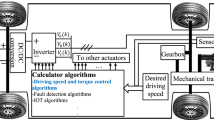Abstract
Unexpected disturbance and ever-changing passengers are unfavorable factors that always accompany maglev trains. If not considered or handled properly, they would deteriorate the control system performance significantly and even cause instability. This paper proposes a neural network-based adaptive control approach to stabilize the airgap of the nonlinear maglev vehicle. Meanwhile, the time-varying mass and external disturbance can be estimated accurately. Specifically, to ensure the asymptotic stability of the maglev system, a nonlinear basic control law is developed first. To tackle the uncertainty, a radial basis function neural network is fused into the basic controller, which can recover the unknown mass and disturbance more quickly and accurately. Lyapunov stability techniques are utilized to prove the stability of the whole maglev control system without any linear approximation. The sufficient comparative simulation results are provided to demonstrate that the established control scheme can obtain better levitation performance and achieve a precise estimation of time-varying and disturbance simultaneously. Finally, we build a dSPACE-based single electromagnet suspension test bed to examine its efficacy and practical applicability as well.























Similar content being viewed by others
References
Boldea I, Tutelea L, Xu W et al (2017) Linear electric machines, drives, and MAGLEVS: an overview. IEEE Trans Ind Electron 65(9):7504–7515
Lee HW, Kim KC, Lee J (2006) Review of maglev train technologies. IEEE Trans Magn 42(7):1917–1925
Soejima H (2000) Maglev: the 21st century railway. Int Railw J Rapid Trans Rev 40(1)
Thornton RD (2009) Efficient and affordable maglev opportunities in the United States P. IEEE 97(11):1901–1921
Na J, Huang Y, Wu X et al (2017) Active adaptive estimation and control for vehicle suspensions with prescribed performance. IEEE Trans Control Syst Technol 26(6):2063–2077
Pan H, Sun W, Jing X, Gao H, Yao J (2017) Adaptive tracking control for active suspension systems with non-ideal actuators. J Sound Vib 399:2–20
Jiang M-M, Xie X-J, Zhang K (2019) Finite-time stabilization of stochastic high-order nonlinear systems with FT-SISS inverse dynamics. IEEE Trans Autom Control 64(1):313–320
Xie X-J, Jiang M (2019) Dynamic state feedback stabilization of stochastic cascade nonlinear time-delay systems with SISS inverse dynamics. IEEE Trans Autom Control 64(12):5132–5139
Li TS, Zhao R, Chen CLP, Fang LY, Liu C (2018) Finite time formation control of under-actuated ships using nonlinear sliding mode control. IEEE Trans Cybern 48(11):3243–3253
Su C, Stepanenko Y (1995) Adaptive sliding mode coordinated control of multiple robot arms attached to a constrained object. IEEE Trasn Syst Man Cybern 25(5):871–878
Sun Y, Qiang H, Xu J et al (2020) Internet of things-based online condition monitor and improved adaptive fuzzy control for a medium-low-speed maglev train system. IEEE Trans Ind Inform 16(4):2629–2639
Yang T, Sun N, Chen H et al (2020) Neural network-based adaptive antiswing control of an underactuated ship-mounted crane with roll motions and input dead zones. IEEE Trans Neural Netw Learn 31(3):901–914
Shen G, Gang X, Wang H et al (2015) Analysis and experimental study on the MAGLEV vehicle-guideway interaction based on the full-state feedback theory. J Vib Control 21(2):408–416
Yau JD (2009) Vibration control of maglev vehicles traveling over a flexible guideway. J Sound Vib 321(1):184–200
MacLeod C, Goodall RM (1996) Frequency shaping LQ control of maglev suspension systems for optimal performance with deterministic and stochastic inputs. IEE P-Control Theor Appl 143(1):25–30
Sun Y, Xu J, Qiang H, Wang W, Lin G (2019) Hopf bifurcation analysis of maglev vehicle–guideway interaction vibration system and stability control based on fuzzy adaptive theory. Comput Ind 108:197–209
He G, Li J, Cui P (2016) Nonlinear control scheme for the levitation module of maglev train. J Dyn Syst-T ASME 138(7):1–8
Sinha PK, Pechev AN (1999) Model reference adaptive control of a maglev system with stable maximum descent criterion. Automatica 35(8):1457–1465
Wai RJ, Chen MW, Yao JX (2016) Observer-based adaptive fuzzy-neural-network control for hybrid maglev transportation system. Neurocomputing 175:10–24
Morales R, Feliu V, Sira-Ramirez H (2011) Nonlinear control for magnetic levitation systems based on fast online algebraic identification of the input gain. IEEE Trans Control Syst Technol 19(4):757–771
Sun Y, Qiang H, Mei X et al (2018) Modified repetitive learning control with unidirectional control input for uncertain nonlinear systems. Neural Comput Appl 30(6):2003–2012
Li J, Li J, Zhou D et al (2015) The active control of maglev stationary self-excited vibration with a virtual energy harvester. IEEE Trans Ind Electron 62(5):2942–2951
Sun N, Fang Y, Chen H (2017) Tracking control for magnetic-suspension systems with online unknown mass identification. Control Eng Pract 58:242–253
Xu J, Du Y, Chen YH et al (2018) Adaptive robust constrained state control for non-linear maglev vehicle with guaranteed bounded airgap. IET Control Theory A 12(11):1573–1583
Songqi L, Kunlun Z, Guoqing L, Wei G (2015) EMS maglev vehicles model reference adaptive control. In: 2015 34th Chinese control conference (CCC), Hangzhou, pp 2989–2993
Sun Y, Li W, Xu J et al (2017) Nonlinear dynamic modeling and fuzzy sliding-mode controlling of electromagnetic levitation system of low speed maglev train. J Vibroeng 19(1):328–342
Qiang H, Li W, Sun Y, Liu X (2017) Levitation chassis dynamic analysis and robust position control for maglev vehicles under nonlinear periodic disturbance. J Vibroeng 19(2):1273–1286
Funding
Funding was provided by National Natural Science Foundation of China (Grant No. 51905380 & 52072269), China Postdoctoral Science Foundation (Grant No. 2020T130475).
Author information
Authors and Affiliations
Corresponding author
Ethics declarations
Conflict of interest
The authors declare that they have no conflict of interest.
Additional information
Publisher's Note
Springer Nature remains neutral with regard to jurisdictional claims in published maps and institutional affiliations.
Rights and permissions
About this article
Cite this article
Sun, Y., Xu, J., Lin, G. et al. Adaptive neural network control for maglev vehicle systems with time-varying mass and external disturbance. Neural Comput & Applic 35, 12361–12372 (2023). https://doi.org/10.1007/s00521-021-05874-2
Received:
Accepted:
Published:
Issue Date:
DOI: https://doi.org/10.1007/s00521-021-05874-2




